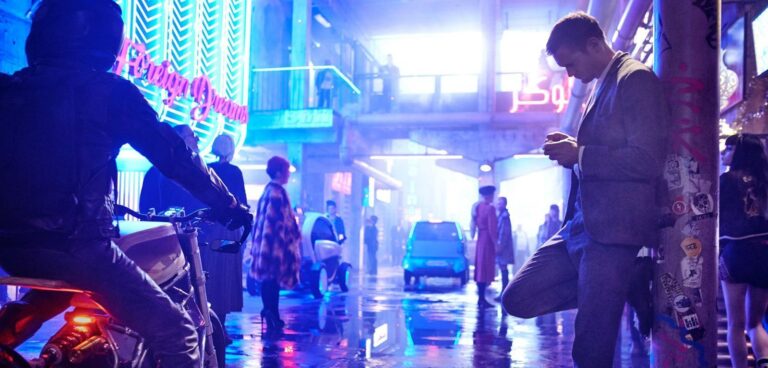As Netflix continues to expand its library of original content, the streaming network’s executive team seems uniquely focused on attracting top-tier Hollywood talent, oftentimes at the expense of quality. Regrettably, the latest sci-fi offering from writer and director Duncan Jones, a longtime passion project called Mute, is another example of Netflix relinquishing creative control to a filmmaker, only to have the end result fall short of whatever lofty aspirations might have been present at the outcome.
Taking place in a near-future version of Berlin whose dim, neon-lit streets could easily be mistaken for Blade Runner‘s futuristic Los Angeles (if not for a noticeable difference in the amount of money being spent on production design), Mute centers on Leo (Alexander Skarsgård), a bartender at a seedy nightclub who was left unable to speak after a tragic boating accident, and an even more tragic decision by his Amish parents not to allow surgeons to repair the damage. “God will heal him,” she insists in a flashback, but God must have taken the day off.
In a world where humans are enhanced with cybernetic limbs and airborne drones can deliver piping hot meals to your exact location, Leo is something of an anomaly, a Luddite who doesn’t own a cell phone, wears hand-crafted clothing and spends his free time carving intricate wooden charms that he gifts to his girlfriend, a blue-haired cocktail waitress named Naadirah (Seyned Saleh). She finds Leo’s aversion to technology endearing, and gifts him with an ancient smartphone (“the most basic one I could find”) that will come in handy as he begins to investigate her sudden disappearance, shortly after confessing that she’s been keeping a secret.

Elsewhere, we’re introduced to Cactus Bill (Paul Rudd), an obnoxious American military veteran with a handlebar mustache and endless supply of loud Hawaiian shirts, and his partner Duck (an unrecognizable Justin Theroux), a pair of underground surgeons working for the mob in exchange for a set of fake passports that will grant Cactus and his adolescent daughter safe passage out of Berlin, away from the MPs that patrol the streets looking for deserters. It’s clear that Cactus is AWOL, but aside from a brief mention of a conflict in “New Kandahar,” there’s little context given for the American military’s presence in the city.
Thanks to the chemistry between Rudd and Theroux, and a characterization that Jones admits was cribbed almost completely from the relationship between Hawkeye and Trapper in M*A*S*H*, the duo’s scenes are some of the most engaging in the entire film – until we learn that one character has some particularly disturbing interests, which makes each subsequent interaction creepy and unsettling. This revelation feels completely unnecessary, and does almost nothing that affects that narrative, other than to provide a character with an absurdly dark comeuppance during the third act – but as audience members, it’s almost impossible to feel good about this when it happens.
For the bulk of the film, the exploits of Cactus and Duck seem detached from Leo’s quest to ascertain Naadirah’s whereabouts – a quest that Leo is so remarkably well-equipped to handle that it far exceeds the limits of credulity. This shy, simple man with barely a passing understanding of technology is piecing together clues faster than the lead character in a Dashiel Hammett novel, and his willingness to take on underworld thugs while armed with only a hand-carved bedpost (I’m totally serious) just feels ridiculous. When both narratives finally converge, the “surprise” lands with a resounding thud – mostly because we have no real attachment to any of the characters involved. And while there’s a perfectly suitable point at which Jones could’ve brought the story to a close, he instead labors onward for twenty more excruciating minutes.

Skarsgård is a fine actor, but between his lack of spoken dialogue and a character written with as much personality as the bedpost he wields in combat, he’s seldom engaging. The decision to set Mute against a futuristic sci-fi backdrop is another curiosity – it makes for some striking visuals every once in awhile, but there’s very little about the world itself that informs the narrative. Had Jones opted to relate this same tale in modern times, perhaps he would’ve been less prone to attempts at stylistic flourishes, and we would spend less time thinking about how many elements feel cribbed from other, better sci-fi stories.
The latest sci-fi offering from writer and director Duncan Jones is another example of Netflix relinquishing creative control to a filmmaker, only to have the end result fall well short of expectations.
-
Score4

